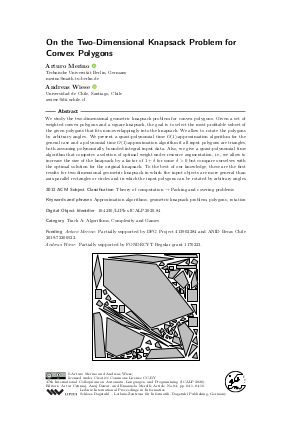On the Two-Dimensional Knapsack Problem for Convex Polygons
Authors
Arturo Merino  ,
Andreas Wiese
,
Andreas Wiese 
-
Part of:
Volume:
47th International Colloquium on Automata, Languages, and Programming (ICALP 2020)
Part of: Series: Leibniz International Proceedings in Informatics (LIPIcs)
Part of: Conference: International Colloquium on Automata, Languages, and Programming (ICALP) - License:
 Creative Commons Attribution 3.0 Unported license
Creative Commons Attribution 3.0 Unported license
- Publication Date: 2020-06-29
File

PDF
LIPIcs.ICALP.2020.84.pdf
- Filesize: 0.62 MB
- 16 pages
Document Identifiers
Subject Classification
ACM Subject Classification
- Theory of computation → Packing and covering problems
Keywords
- Approximation algorithms
- geometric knapsack problem
- polygons
- rotation
Metrics
- Access Statistics
-
Total Accesses (updated on a weekly basis)
0Document
0Metadata
Abstract
We study the two-dimensional geometric knapsack problem for convex polygons. Given a set of weighted convex polygons and a square knapsack, the goal is to select the most profitable subset of the given polygons that fits non-overlappingly into the knapsack. We allow to rotate the polygons by arbitrary angles. We present a quasi-polynomial time O(1)-approximation algorithm for the general case and a polynomial time O(1)-approximation algorithm if all input polygons are triangles, both assuming polynomially bounded integral input data. Also, we give a quasi-polynomial time algorithm that computes a solution of optimal weight under resource augmentation, i.e., we allow to increase the size of the knapsack by a factor of 1+δ for some δ > 0 but compare ourselves with the optimal solution for the original knapsack. To the best of our knowledge, these are the first results for two-dimensional geometric knapsack in which the input objects are more general than axis-parallel rectangles or circles and in which the input polygons can be rotated by arbitrary angles.
Cite As Get BibTex
Arturo Merino and Andreas Wiese. On the Two-Dimensional Knapsack Problem for Convex Polygons. In 47th International Colloquium on Automata, Languages, and Programming (ICALP 2020). Leibniz International Proceedings in Informatics (LIPIcs), Volume 168, pp. 84:1-84:16, Schloss Dagstuhl – Leibniz-Zentrum für Informatik (2020)
https://doi.org/10.4230/LIPIcs.ICALP.2020.84
BibTex
@InProceedings{merino_et_al:LIPIcs.ICALP.2020.84,
author = {Merino, Arturo and Wiese, Andreas},
title = {{On the Two-Dimensional Knapsack Problem for Convex Polygons}},
booktitle = {47th International Colloquium on Automata, Languages, and Programming (ICALP 2020)},
pages = {84:1--84:16},
series = {Leibniz International Proceedings in Informatics (LIPIcs)},
ISBN = {978-3-95977-138-2},
ISSN = {1868-8969},
year = {2020},
volume = {168},
editor = {Czumaj, Artur and Dawar, Anuj and Merelli, Emanuela},
publisher = {Schloss Dagstuhl -- Leibniz-Zentrum f{\"u}r Informatik},
address = {Dagstuhl, Germany},
URL = {https://drops.dagstuhl.de/entities/document/10.4230/LIPIcs.ICALP.2020.84},
URN = {urn:nbn:de:0030-drops-124916},
doi = {10.4230/LIPIcs.ICALP.2020.84},
annote = {Keywords: Approximation algorithms, geometric knapsack problem, polygons, rotation}
}
Author Details
Funding
- Merino, Arturo: Partially supported by DFG Project 413902284 and ANID Becas Chile 2019-72200522.
- Wiese, Andreas: Partially supported by FONDECYT Regular grant 1170223.
References
-
Anna Adamaszek and Andreas Wiese. A QPTAS for maximum weight independent set of polygons with polylogarithmically many vertices. In Proceedings of the 25th Annual ACM-SIAM Symposium on Discrete Algorithms (SODA 2014), pages 645-656. SIAM, 2014.

-
Anna Adamaszek and Andreas Wiese. A quasi-PTAS for the two-dimensional geometric knapsack problem. In Proceedings of the 26th Annual ACM-SIAM Symposium on Discrete Algorithms (SODA 2015), pages 1491-1505. SIAM, 2015.

-
Nikhil Bansal, Alberto Caprara, Klaus Jansen, Lars Prädel, and Maxim Sviridenko. A structural lemma in 2-dimensional packing, and its implications on approximability. In Algorithms and Computation (ISAAC 2009), volume 5878 of LNCS, pages 77-86. Springer, 2009.

-
Edward G Coffman, Jr, Michael R Garey, David S Johnson, and Robert Endre Tarjan. Performance bounds for level-oriented two-dimensional packing algorithms. SIAM Journal on Computing, 9:808-826, 1980.

- Waldo Gálvez, Fabrizio Grandoni, Sandy Heydrich, Salvatore Ingala, Arindam Khan, and Andreas Wiese. Approximating geometric knapsack via l-packings. In 58th IEEE Annual Symposium on Foundations of Computer Science, FOCS 2017, Berkeley, CA, USA, October 15-17, 2017, pages 260-271, 2017. URL: https://doi.org/10.1109/FOCS.2017.32.
- Sandy Heydrich and Andreas Wiese. Faster approximation schemes for the two-dimensional knapsack problem. ACM Trans. Algorithms, 15(4):47:1-47:28, 2019. URL: https://doi.org/10.1145/3338512.
-
Klaus Jansen and Roberto Solis-Oba. New approximability results for 2-dimensional packing problems. In Mathematical Foundations of Computer Science (MFCS 2007), volume 4708 of LNCS, pages 103-114. Springer, 2007.

-
Klaus Jansen and Roberto Solis-Oba. A polynomial time approximation scheme for the square packing problem. In Integer Programming and Combinatorial Optimization (IPCO 2008), volume 5035 of LNCS, pages 184-198. Springer, 2008.

-
Klaus Jansen and Guochuan Zhang. Maximizing the number of packed rectangles. In Algorithm Theory (SWAT 2004), volume 3111 of LNCS, pages 362-371. Springer, 2004.

- Klaus Jansen and Guochuan Zhang. On rectangle packing: maximizing benefits. In Proceedings of the 15th Annual ACM-SIAM Symposium on Discrete Algorithms (SODA 2004), pages 204-213. SIAM, 2004. URL: http://dl.acm.org/citation.cfm?id=982792.982822.
-
Joseph YT Leung, Tommy W Tam, CS Wong, Gilbert H Young, and Francis YL Chin. Packing squares into a square. Journal of Parallel and Distributed Computing, 10(3):271-275, 1990.

-
Carla Negri Lintzmayer, Flávio Keidi Miyazawa, and Eduardo Candido Xavier. Two-dimensional knapsack for circles. In Latin American Symposium on Theoretical Informatics, pages 741-754. Springer, 2018.

-
A Steinberg. A strip-packing algorithm with absolute performance bound 2. SIAM Journal on Computing, 26(2):401-409, 1997.

